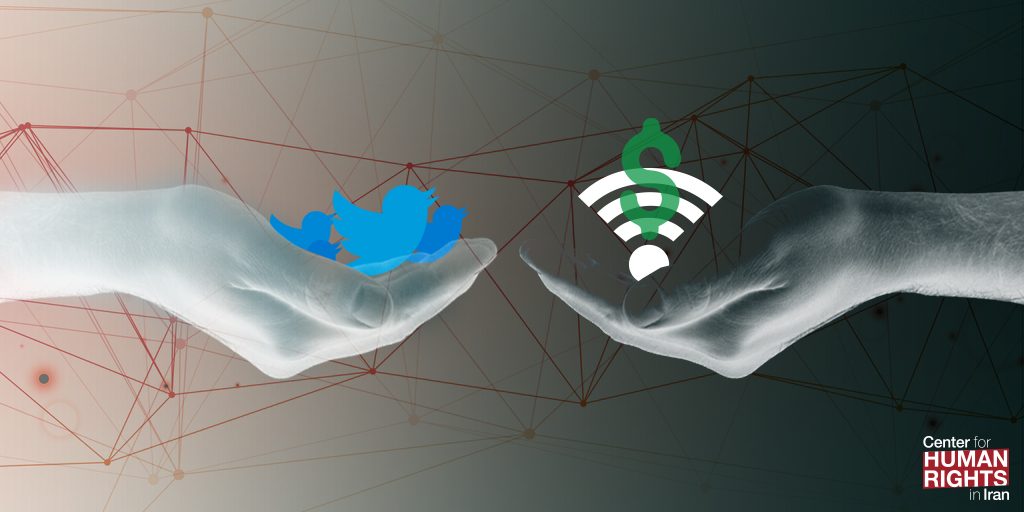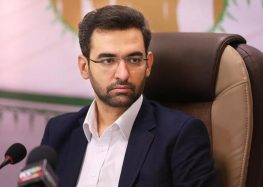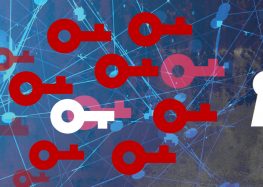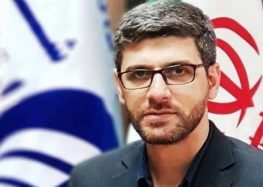Iran’s Telecommunications Minister Accused of Giving Influencers “Perks” to Help Bury Security Ties

Mohammad Javad Azari Jahromi Denies Future Presidential Bid
Amid rumors that Iran’s Telecommunications Minister Mohammad Javad Azari Jahromi is eyeing a future presidential bid, investigations by the Center for Human Rights in Iran (CHRI) reveal that organized efforts are being made to bury allegations that he was once a state-employed interrogator.
CHRI has also learned that members of a group that appears to be operating like a public relations (PR) team working on Jahromi’s behalf have been given access to uncensored internet, which is otherwise off-limits to civilians in Iran.
Azari Jahromi has denied the existence of a PR team working on his behalf.
But one source told CHRI that he had been repeatedly contacted by members of the group and was later pursued by officials from the Ministry of Information and Communications Technology (Telecommunications Ministry) who pressured this individual to help improve Azari Jahromi’s online reputation.
“The head of the ministry’s public relations office contacted me and said, ‘We want to get rid of the security brand hanging over Jahromi’s head,” said the source who requested anonymity for security reasons.
CHRI has also been informed by multiple sources that some of those who collaborate with the group receive a monthly stipend and are given access to uncensored internet.
Asked about the perks, one of the admins of a popular channel on Telegram who said he had been contacted by the group told CHRI: “In the beginning, they don’t clearly tell you that they are going to give you uncensored or free internet in return for doing certain things.”
The source continued: “They try to build relations and trust with channel admins and gain their cooperation. If they don’t get the result they want, they repeatedly remind you that they gave you certain services but in return they did not get your support.”
On June 2, 2018, conservative journalist Mohammad Salehi Meftah published a photo of himself with Azari Jahromi on Twitter while bragging about having access to uncensored internet.
“During an Iftar reception I had a chat with @azarijahromi. I thanked him for the uncensored internet and he complained about a tweet where I had been critical of him,” Meftah tweeted.
In another tweet that day, Meftah wrote, “In the initial stage, the authorities gave uncensored internet to 100 media professionals without them asking for it. They will give it to others, too. I’m not the only bad guy.”
Another person who attended a gathering with Azari Jahromi in March 2019 told CHRI on condition of anonymity, “A number of those who attended the meeting have received uncensored internet.”
Some journalists criticized the preferential treatment.
“Giving uncensored internet to [state-approved] journalists is favoritism and hush money,” ISNA reporter Fatemeh Karimkhan tweeted on April 4, 2018.
“Our blood does not have a different color than the rest of the people,” she added. “Free access to information and the internet is a human right and filtering it is a violation of that right. Personally, I will not accept the favor of uncensored internet for journalists.”
Jahromi Denies PR Efforts, Presidential Aspirations
In March 2019, Azari Jahromi stated on the record that he has no “team in cyberspace.”
In an interview with the Khabar Online news website, the 37-year-old minister was asked, “Some people believe that there are users on Twitter and other social media generally known as the ‘minister’s optimists’ actively promoting you. Do you have such a team?”
Azari Jahromi replied, “If they have such a report, they should publish it and reveal their identities for the public to see.”
He added: “I don’t have any team on cyberspace. Take a look at the comments under my Twitter posts. It’s not as if some group is constantly praising me and showering me with flowers. In fact, most of the space surrounding my Twitter account is filled with criticism by various groups.”
In the same interview, the minister was asked whether he worked in the Intelligence Ministry, “My pointed question is, Were you once an interrogator or not?”
Azari Jahromi replied, “No, I was not.”
However, CHRI was previously informed that Azari Jahromi had personally interrogated at least five people who had been detained during Iran’s 2009 protests. During this time, he asked them to hand over the passwords to their social media and email accounts, according to these sources.
CHRI did not directly quote these activists to protect their identities.
This criticism was echoed during Azari Jahromi’s confirmation debate in Parliament on August 15, 2017, when lawmaker Mohammad Ali Pourmokhtar lamented, “My concern is that we will turn the Telecommunications Ministry into the Intelligence Ministry.”
In addition to being condemned for his alleged security-intelligence background, Azari Jahromi has attracted criticism for his moves as telecommunications minister, including supporting policies that violate net neutrality principles, and promoting Telegram Talaeii, a messaging app used by an estimated 35 million Iranians that appears to be under the control of the Intelligence Ministry.
According to CHRI’s findings, a group of people has been working to improve Azari Jahromi’s online reputation since at least December 2018, when some participants at a meeting of conservative online influencers published photos of the meeting online.
The participants included deputy ministers as well as Kobra Asoupar, a reporter for Javan, a newspaper close to the Islamic Revolutionary Guard Corps (IRGC); Mohammad Reza Bagheri, a producer working for the state-funded Islamic Republic of Iran Broadcasting organization; Mohammad Salehi Meftah, a reporter close to former conservative Tehran mayor and presidential candidate Mohammad Bagher Ghalibaf; Zahra Tabakhi, a reporter for the hardline Kayhan newspaper; and Sadegh Nikoo, a columnist for the Fars News Agency, which maintains close ties to the IRGC’s Basij militia.
Since Azari Jahromi took over the Telecommunications Ministry, CHRI has been informed of at least seven meetings he has held with editors of state-funded news websites, admins of widely followed channels on the Telegram and Instagram apps, as well as with well-known conservatives and reformists that are active on social media.
Riding the Wave of Uncensored Internet and Twitter to the Presidency?
Some sources speculated to CHRI that Azari Jahromi has supported granting state-approved journalists uncensored internet access as well as removing the state ban on Twitter so he can take credit for these actions when he announces his presidential bid.
The minister initially proposed providing uncensored internet access to state-approved journalists on October 29, 2017.
At that time, he admitted that he also has access to uncensored internet and added that the state’s Working Group for Determining Instances of Criminal Content (WGDICC) had issued an order to grant uncensored internet to news agencies and reporters.
In December 2018, a month before Supreme Leader Ali Khamenei made a speech encouraging young Iranians to be more active in cyberspace as a means of “slapping the enemy,” Azari Jahromi suggested publicly several times that Twitter should be unblocked in Iran.
Along with five other cabinet ministers, he also sent a letter in May 2018 to Prosecutor General Mohammad Jafar Montazeri urging him to make Twitter officially accessible in Iran (some currently access it by using online censorship circumvention tools).
The admin of a Telegram channel who said he had been contacted by the pro-Jahromi group told CHRI, “So far, Mr. Jahromi has not done anything big. But if he removes the filter on Twitter, he will become a hero and that props him up to become a candidate in the 2021 presidential election.”
Amid swirling rumors that Azari Jahromi was considering a presidential bid he issued a denial on July 21, 2018, in an interview with the state-funded Iranian Labor News Agency, “Those who are concerned about this should rest assured that I will not become a candidate for president.”






